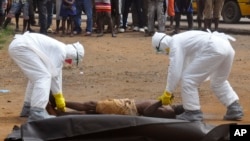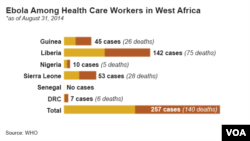The World Health Organization said Ebola treatment centers in and around Monrovia need to triple their capacity to 1,000 beds, because as more people become ill and they seek treatment, clinics are having to turn some patients away.
Ebola treatment units in Monrovia are filled to overflowing. Each is only able to take in a trickle of new patients as beds become free.
The ELWA-3 clinic is no exception.
A VOA reporter outside the clinic saw a woman vomiting in the back of a taxi Tuesday morning as her sister, wearing gloves, held her. The taxi driver had run away, abandoning the vehicle.
Three other cars parked nearby each had a sick person sprawled in the back seat.
Resident Jerry Dope said he had been driving since sunrise, trying to find health care for his nephew, who was ill. The ELWA-3 clinic is the third care center they had visited.
“I brought my nephew. He has been sick. His skin is hot with fever. We brought him here this morning, but we are told there is no space in there, so we are confused," said Dope. "We don’t know where to go. We don’t know where to head right now.”
Not enough hospital beds
A guard at the clinic said it has been like this for the past three weeks.
“We see sometimes three, four cars coming in front of the gate and then sometimes only one will be [attended] to, and the rest remain there until they are dead," the guard said.
The ELWA-3 clinic, run by Médecins Sans Frontières/Doctors Without Borders [MSF], is the largest in Monrovia. They are in the process of expanding from 120 beds to 400 beds.
Crews are working around the clock to get a new government-run treatment unit, with 100 beds, open later this week in Monrovia.
But the World Health Organization said that is not enough. The caseload is exploding in Montserrado County, which contains the capital.
The WHO said 1,000 beds are needed and that hundreds of health workers must also be trained to staff the new treatment units.
WHO spokesman Tarik Jasaveric said, "All these [sick] people who are outside may potentially infect other people, so this is why we are saying it is really urgent to step up the response.”
Public health experts said survival chances are better for those patients who get supportive medical care soon after symptoms start.
Liberia crisis
Liberia’s defense minister told the U.N. Security Council Tuesday the Ebola virus has become a health emergency surpassing his government’s capacity to respond.
Liberia is the hardest hit of the West African countries affected by the ongoing outbreak of the disease. Nine of the country’s 15 counties are currently affected and the Ministry of Health has put the number of reported cases above 2,000 with over 1,000 deaths.
Meanwhile, the death toll from the West African Ebola outbreak has climbed to 2,296 - an increase of 200 in just four days.
The World Health Organization's latest update on the crisis, released Tuesday, says a total of nearly 4,300 cases of Ebola have been reported across five West African countries.
Just under half of all reported cases and deaths come from Liberia. A WHO report on Liberia, released Monday, warned the number of new cases there is "increasing exponentially" and said thousands of new patients can be expected over the next three weeks.
The WHO says "intense transmission" of the disease also continues in Guinea and Sierra Leone
Liberia’s Defense Minister Brownie Samukai told the Security Council that Ebola is affecting every sector of society.
“We are meeting at a time when Liberia is facing a serious threat to its national existence. The deadly Ebola virus has caused a disruption of the normal functioning of our state,” said Samukai.
He said the government has taken emergency steps to limit the spread of the disease including declaring a 90-day state of emergency, putting non-essential government employees on leave, quarantining severely affected communities and imposing a nationwide curfew.
“In spite of all these measures, continued denial, traditional practices, religious rituals, fear and community resistance still constitute obstacles to progress,” said Samukai.
Minister Samukai said the country lacks the infrastructure, logistical capacity, professional expertise and financial resources to effectively combat Ebola and he welcomed U.N. and international assistance.
The top U.N. diplomat in Liberia, Karin Landgren, said the spread of the disease has been “merciless."
“The speed and scale of loss of lives, and the economic, social, political and security reverberations of the crisis, are affecting Liberia profoundly," said Landgren.
Landgren warned there is a potential for instability as the health system struggles, the economy suffers, food shortages spread and political processes, such as planned senate elections for October, become delayed.
She said the country, which had the weakest health system in the region before the crisis, is overwhelmed, with a shortage of medical workers and beds in treatment centers. At least 160 health workers have been infected, and about 80 have died from the virus with its hemorrhagic fever-like symptoms.
Landgren said the U.N. Mission in Liberia is focused completely on combating Ebola and offered significant logistical support to the government response.
The United Nations says Secretary-General Ban Ki-moon is planning to convene a high-level event on the sidelines of the General Assembly annual debate later this month to highlight the needs and required response to Ebola from the private and public sectors.
Refining the health message
Meanwhile, the importance of local efforts to spread messages about Ebola were emphasized during a two-day forum that wrapped up Tuesday in Dakar.
West African health authorities were meeting to figure out how to better communicate with people affected by Ebola.
Their common message: Local leaders need to be patients' allies.
The conference was organized by the International Federation of Red Cross and Red Crescent Societies.
Africa zone director Alasan Senghore said the solution is to involve local communities more in outreach, to talk with people, instead of at them.
“People don’t understand and when they don’t understand they are bound to create problems even for those who are trying to help them," said Senghore.
Dr. Mariane Ngoulla, health adviser for the Economic Community of West African States, said the effort needs a cooperative approach.
“If we approach them and say, ‘We have something to share with you. How do we do it?’ they will tell us. They will listen, and we will change what needs to be changed.”
'Women-to-women communication'
Women account for more than half of Ebola deaths in this outbreak. Public health experts said early interventions did not focus enough on women.
Now Grev Hunt, sub-regional coordinator on Ebola for the U.N. Children’s Emergency Relief Fund, said that is changing.
“We are using women-to-women communication," he said. "In addition, we are developing materials for our illiterate populations and the preferred method is going door to door."
"One woman talking to another woman on how she can protect her loved ones. So she is using her heart and her hands to keep her loved ones safe," Hunt added.
However, he said the message also must evolve with reality.
'Treat at home'
In the early days of the outbreak, much of the communication work was focused on getting people to accept that “Ebola is real” and to seek treatment.
Now, Hunt said, treatment centers are at capacity and many health workers are refusing to come to work.
"We’re saying treat at home because there is not the capacity, there aren’t enough beds in the treatment centers," Hunt said. "It’s morally difficult for us to say. But what we’re teaching them is how to keep their hands protected, how to rehydrate the patient. We’re trying to institute intermediary measures."
VOA's Margaret Besheer at the United Nations in New York contributed to this report.






